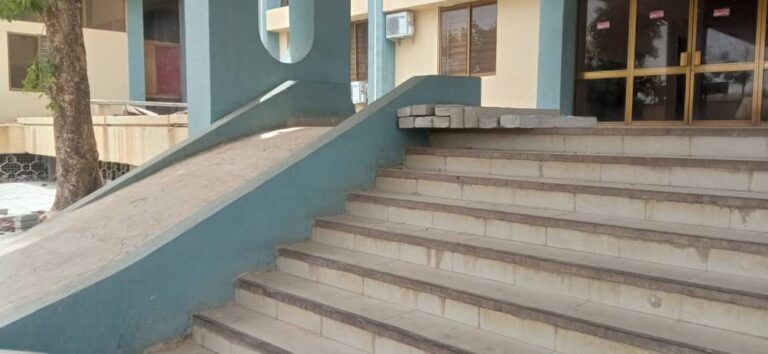By Caleb Jacob
Despite the passage of the Discrimination Against Persons with Disabilities (Prohibition) Act in 2018, individuals with special needs in Kano State continue to struggle with limited access to public buildings—five years past the law’s deadline for full compliance.
A key provision of the Act guarantees persons with disabilities (PWDs) equal access to physical environments and public structures. Ironically, the same government responsible for enforcing the law has yet to ensure compliance within its own institutions.
However, this Grassroots Parrot’s special report investigates the unfulfilled promises of accessibility, the persistent barriers facing PWDs, and their growing calls for accountability.
Victims Recount Plight of Inaccessibility
Abdulrazaq Ado Zango, Chairman of the Kano Initiatives of Persons with Special Needs in Kano, is one of many who continue to face barriers across public spaces in Kano.
Zango laments that government offices, hospitals, and courts remain largely inaccessible, lacking ramps, lifts, or features for the hearing and visually impaired.
READ ALSO: Hardship: Persons With Disabilities Lament ‘Second Class Treatment’ In Hospitals
“If you look at the schools, you look at police stations, courts, marketplaces, airports and other public buildings, we persons with disabilities are not being considered right from the design of these buildings up to the final establishment of the buildings,” He said.
He emphasized that accessibility is often overlooked from the design phase, adding, “It’s about time we call the government to install ramps, braille signs, and hearing-impaired signage.”
Suleiman Zubairu, Secretary of the Kano Initiatives, cited Gidan Murtala as a prime example of neglect.
“Like Gidan Murtala, how can a visually impaired person enter easily? It’s not possible! I’m calling on the government – any building without access for persons with disabilities – they should call their engineers to do their work on it,” Zubairu appealed.
In the same vein, Yahaya A. Yahaya, Chairman of Persons with Physical Challenges, joined the calls for urgent government action.
What the Law Demands—and What’s Missing
Signed into law in 2019, the Discrimination Against Persons with Disabilities (Prohibition) Act granted a five-year grace period for public buildings to meet accessibility standards—a deadline that expired in 2024.
Though Kano domesticated the law in 2022, compliance remains minimal.
READ ALSO: Kano Govt. Set To Establish People With Disabilities Agency
Section 7 of the Act mandates all public building plans to incorporate accessibility features. Any government agency approving non-compliant buildings is in violation. Penalties for non-compliance include a ₦1 million fine or two years imprisonment.
Yet enforcement remains weak.
Partial Compliance Across Public Institutions
A visit to the Audu Bako Secretariat—home to numerous government Ministries, Department and Agencies MDAs —revealed no accessibility upgrades.
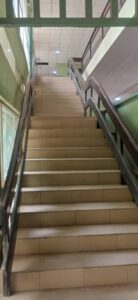
Although Gidan Murtala features ramps, it’s unclear if new elevator installations are adapted for the visually impaired.
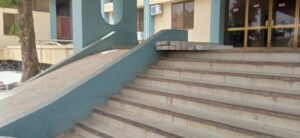
At Sir Sunusi Hospital, there are ramps for persons accessing the building on wheelchairs, including slopes for ascending and descending the stairs.
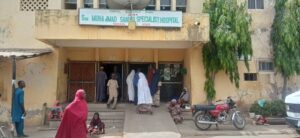
Meanwhile, Abdullahi Wase Teaching Hospital, currently under renovation, includes ramps at most entrances.
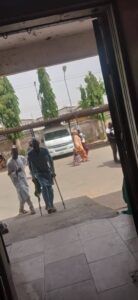
Still, these modifications remain exceptions rather than the rule.
Even Government Officials Struggle
Dr. Binta Bala, Director for People with Disabilities at the Ministry of Women Affairs, Children, and Disabled, revealed that over 80 percent of public buildings in Kano are inaccessible.
“I, as a person with disability and other members of my department, do face a lot of challenges accessing public buildings because almost 70% or 80% of the public buildings are not accessible to us.
“You will find that there are no ramps for those in wheelchairs, no lifters to access the story buildings.” Dr. Binta explained.
“The last two to three weeks ago, I was at the Audu Bako secretariat, it was tedious work for me to access the first floor.” Dr. Binta explained.
READ ALSO: Kano Begins Crackdown On Tricycle Riders Displaying Indecent Posters
The Director noted that while some buildings offer elevators, they lack tactile buttons or braille features for visually impaired users.
She urged PWDs to explore legal action, adding, “They should challenge the case. It is very painful to go to a place that you cannot access in the end. I have to pursue this. I will advise my fellow people with disabilities to pursue this.”
Professional Advice
When contacted, Engr. Marwan Ahmad, Kano State Commissioner for Works, confirmed his ministry had received a memo from the Women Affairs Ministry and promised prompt action.
Meanwhile, Nura Mohammed Adamu, a civil engineer, advised that all builders adhere strictly to the national building code, which mandates accessibility features in public structures.
“Retrofitting an existing building could be quite challenging, especially when features like elevators should be considered, because of its associated costs and structural implications on the existing building.
“But simple features such as ramps, signage and so on, can easily be provided on the existing building to serve the people with disabilities,” Adamu noted.
READ ALSO: Persons With Disabilities Demand Special Schools In Nasarawa West
When the government, a supposed enforcer of the law, continually flouts it, private organisations will be emboldened, further compounding the discrimination against persons with special needs in Nigeria.
Law Without Enforcement Is No Justice
When the government—tasked with enforcing the law—flouts its own obligations, it sets a dangerous precedent. Private organizations may follow suit, compounding the discrimination faced by persons with disabilities.
However, until words turn into action, accessibility remains a dream deferred for Kano’s special needs community.

